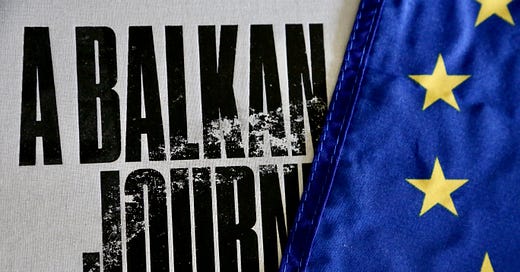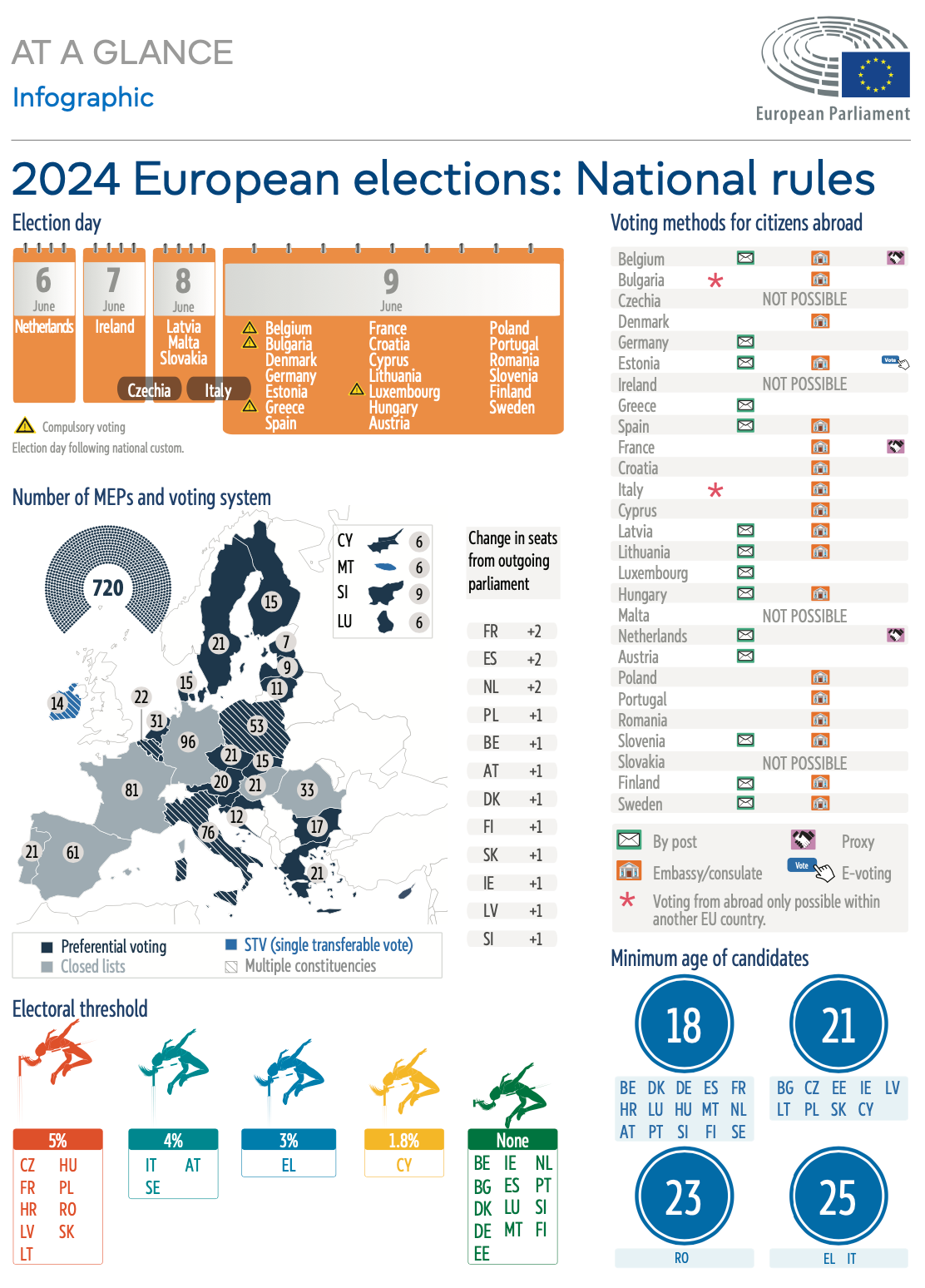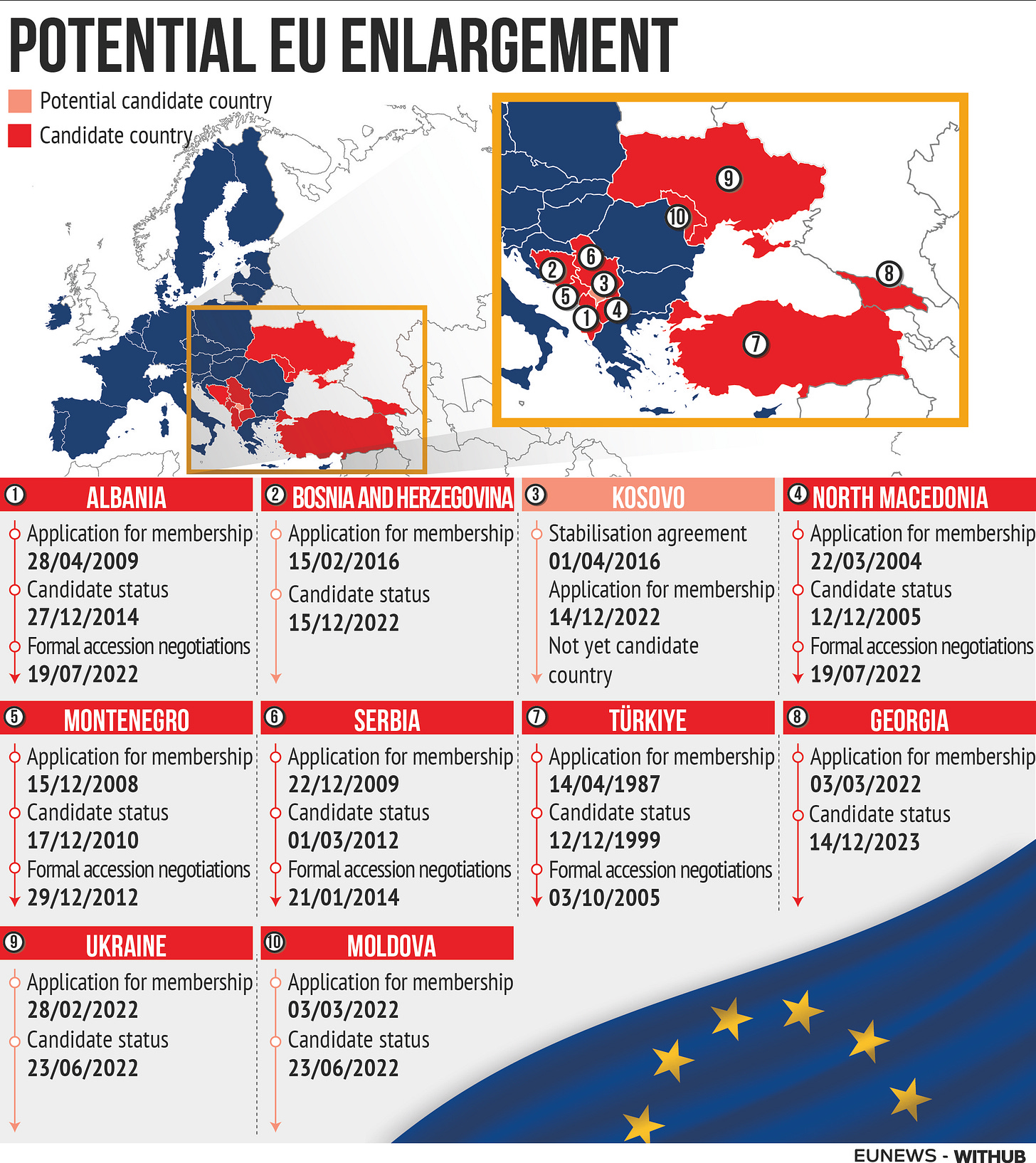S4E21. One vote can change everything
On June 6-9, EU citizens will elect new MEPs, who will be responsible for future EU enlargement. It will also be crucial to allow Balkan countries to participate in the next European elections in 2029
Dear reader,
welcome back to BarBalkans, the newsletter with blurred boundaries.
The time has come. The moment of greatest democratic expression, the moment when the voice of every citizen can be heard.
You may think that it is like a single blade of grass on a football field (by the way, do not miss BarBalkans’ latest interview on Balkan football and fandom). However, if every blade of grass disappeared, what kind of field would it be? And if every citizen thought that their vote did not count for much, what would become of democracy?
From 6 to 9 June, voters from all 27 EU Member States will elect the new Members of the European Parliament, the only EU institution that directly manifests the will of EU citizens.
The right and duty of people who live within the EU is to express their idea of this Union, choosing the candidates who most represent their principles, values and aspirations, in order to shape a better future for everyone.
And do not forget that there are millions of people outside the borders of the EU who would like to join this Union, taking part in the same transnational democratic exercise.
From the six Western Balkan countries to Ukraine, from Georgia to Moldova, and the controversial Türkiye. Future generations may experience a very different European Union compared to the one we know today. Larger, more inclusive and more representative of the entire European continent.
It is called the ‘enlargement of the European Union’, others prefer ‘reunification of Europe’.
In any case, we need to know the electoral programs of the European political parties (which gather the national parties) on this issue to understand which path will be followed in our common future. And to make this vote the last European election held in only 27 Member States.
Only citizens - pushing the institutions through their votes - can make it possible.
We are 450 million citizens, 360 million voters. Our voice counts. And it must also soon count the voice of the 150 million (Balkan and non-Balkan) citizens who are still waiting to join this Union.
This stop of BarBalkans newsletter is based on a prolific collaboration with the editorial staff of Eunews. If you would like to delve further into the topics analyzed below, you can check out this article and the section dedicated to the 2024 European elections.
What we are voting on
For the tenth time since 1979, EU citizens will vote (from 6 to 9 June 2024) for the new composition of the European Parliament.
The European Parliament is the world’s only directly elected transnational assembly. Together with the representatives of the 27 governments of EU countries, it has several powers: it negotiates and decides on laws that influence the lives of citizens, scrutinizes the EU budget, and elects the President of the European Commission (the executive branch of the European Union).
Through the 2024 European elections, 720 MEPs will be elected. Each country elects a different number of MEPs.
Although elections are contested by national political parties in each Member State, once MEPs are elected, they can choose which transnational political group to join.
Because most national parties are affiliated with European-wide political parties. The European People’s Party (EPP), The Party of European Socialists (PES), The Alliance of Liberals and Democrats for Europe (ALDE) and the European Democratic Party (EDP) - part of Renew Europe Now alliance - the European Green Party (EGP), the European Conservatives and Reformists Party (ECR), the Identity and Democracy Party (ID), the Party of European Left (PEL).
This is why European elections are not about measuring the political strength of national parties, but mainly about defining the size of political groups in the European Parliament and possible alliances for a parliamentary majority.
You can find all the useful information about the 2024 European elections here. The election results (overall EU or by each Member State) will be reported live here.
What stage is the EU enlargement process at?
Since we are specifically discussing this topic today, let’s quickly take stock of the progress of the six Western Balkan countries (and four other candidates) on their path to joining the EU.
Montenegro applied for membership in 2008 and started accession negotiations in 2012. It is now the most advanced of all the candidates on its path to joining the EU.
Bosnia and Herzegovina applied for membership in 2016 and was granted candidate status in 2022. In March 2024, the European Council endorsed the opening of accession negotiations, and now only the formal approval of the 27 EU governments is pending.
North Macedonia applied for membership in 2004 and started accession negotiations in 2022, along with Albania, which applied in 2009. The two candidate countries are linked by the same EU enlargement dossier.
Serbia applied for membership in 2009 and started accession negotiations in 2014. The major obstacle is its non-alignment with EU foreign policy on sanctions against Russia.
Kosovo is the only country that does not have candidate status. Following its application in December 2022, the issue is pending in the Council, as five EU Member States do not recognize its sovereignty: Cyprus, Greece, Romania, Spain, and Slovakia.
Ukraine, Moldova and Georgia applied for membership in 2022 - within ten days of the beginning of the Russian invasion of Ukraine - and all three countries were granted candidate status between 2022 and 2023. In 2023, the European Council endorsed the opening of accession negotiations with Ukraine and Moldova, and now only the formal approval of the 27 EU governments is pending.
Türkiye applied for membership in 1987 and was granted candidate status in 1999. However, negotiations (which started in 2005) have been frozen since 2018, due to the illiberal and undemocratic policies of President Recep Tayyip Erdoğan.
Now let's talk about electoral programs
Here are the positions of the European parties (which gather the national parties) on EU enlargement and the reform of the founding Treaties, according to their respective electoral Manifestos.
This will help us understand who represents us best, as well as the basis for the work of elected MEPs in the next legislature.
You will not find the position of the Identity and Democracy Party, because it decided not to adopt a common Manifesto and to give total freedom of choice to its member parties.
European People’s Party
“Every candidate country must be ready for membership. We should take intermediate steps and closer cooperation in the meantime”. This is the heart of the EPP Manifesto.
It is worth mentioning the reference to “respect for good neighbourly relations with all EU Member States”, as a sign of attention to the demands of national parties joining the EPP (such as the Greeks of New Democracy with Albania and North Macedonia and the Bulgarians of Gerb with North Macedonia).
The EPP has ruled out “the possibility of Turkey’s accession” to the EU for the time being, but not “an upgrade of the existing customs union and visa facilitation”.
Read also: S4E9. This is a tipping point
Party of European Socialists (PES)
The PES Manifesto “welcomes” the start of accession negotiations with Ukraine, Moldova and Bosnia and Herzegovina and supports “the European aspirations of Georgia”. While “the accession process with Turkey cannot be resumed in the current circumstances”.
An “effective” enlargement policy also means pursuing a “serious assessment of what reforms of the EU architecture are needed”. For this reason, the next legislative term will be used to “strengthen the EU’s capacity to act in an enlarged Union, with targeted Treaty changes”, including new tools to empower the European Parliament and the European Commission.
Read also: S4E12. The Balkans are disappearing
Renew Europe Now
“Without deep reforms, enlargement risks turning into a failure for all”, the 10 priorities of Renew Europe Now warn: “It’s time to reopen the treaties”.
The goal is the transformation of the European Commission “into a proper democratic government”, the strengthening of the role of the European Parliament and, most of all, “we want to get rid of the vetoes” that stalemate common decisions.
For European liberals, Ukraine “must join and it will join”, and all countries that meet the Copenhagen criteria - including the Western Balkans - “should join the free-movement Schengen area without further delay”.
Read also: S4E14. “The 28th EU Member State by 2028”
European Green Party (EGP)
The European Greens Manifesto recalls that “many people in the European neighbourhood long to become EU citizens”, as part of a political project that is a “promise of peace, justice, shared values and prosperity”.
This is why “all European countries who strive to be part of or re-join the EU” - a clear opening to the United Kingdom - “and who share our values must be welcomed”. Türkiye is not mentioned, while it is explicit the “support of Kosovo’s efforts to become a candidate for EU membership”.
EU enlargement will make “borders less important”, offer “the best prospect for lasting peace and security in Europe”, and serve as a “vital push for internal reforms”. The goal is to “reform the treaties and move forward towards a federal Europe”, starting with overcoming unanimity in the Council.
Read also: S4E7. Can we really trust Edi Rama?
European Conservatives and Reformists Party (ECR)
“It is crucial that the EU does not exploit this opportunity to expand its powers”, the ECR Manifesto points out, regarding EU enlargement and the reform of the founding Treaties. “We will categorically reject any automatic deepening of EU political integration as a direct result of enlargement”.
The rest of the chapter is very vague, except for the fact that ECR “will consider further EU enlargement to strategically important countries”, on the basis of merit and compliance with the Copenhagen criteria.
Party of European Left (PEL)
The Manifesto of the European Left pushes the need to rebuild the Union on “anti-fascist and anti-Nazi values”, focusing on “clear criteria, which must not be watered down” during the enlargement process: “Human rights, the rule of law and the social and political rights of their populations, including minorities”.
The idea of enlargement policy as “an instrument for deepening rifts within Europe and increasing military tensions” is rejected, as well as to “assign the accession countries the role of suppliers of cheap raw materials, agricultural products, and cheap labour as it is doing already now”. Instead, it must focus on “boosting social cohesion in candidate and Member States”.
Pit stop. Sittin’ at the BarBalkans
We have reached the end of this piece of the road.
Today at our bar, the BarBalkans, there is only one recommendation: use your vote, or others will decide for you. And make sure that citizens still waiting to join the European Union can also participate in the next European elections in 2029!
The power in your hands - through a pencil at the polling station - is great. Don’t waste it.
Read also: S4E13. Gastronationalism tastes like nothing
Let’s continue BarBalkans journey. We will meet again in two weeks, for the 22nd and last stop of this season.
A big hug, have a good journey… and see you at the polls!
If you have a proposal for a Balkan-themed article, interview or report, please send it to redazione@barbalcani.eu. External original contributions will be published in the Open Bar section.
The support of readers who every day gives strength to this project - reading and sharing our articles - is also essential to keep BarBalkans newsletter free for everyone.
Behind every original product comes an investment of time, energy and dedication. With your support BarBalkans will be able to elaborate new ideas, interviews and collaborations.
Every second Wednesday of the month you will receive a monthly article-podcast on the Yugoslav Wars, to find out what was happening in the Balkans - right in that month - 30 years ago.
You can listen to the preview of The Yugoslav Wars every month on Spreaker and Spotify.
If you no longer want to receive all BarBalkans newsletters (the biweekly one in English and Italian, Open Bar external contributions, the monthly podcast The Yugoslav Wars for subscribers), you can manage your preferences through Account settings.
There is no need to unsubscribe from all the newsletters, if you think you are receiving too many emails from BarBalkans. Just select the products you prefer!








